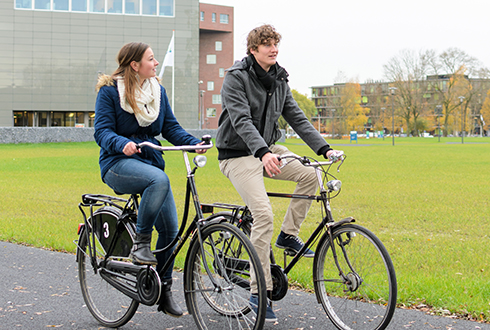Prevent study stress… don’t drive yourself crazy
Did your child get his or her exam results this month? And did they get the grades they need? Congratulations! Now the next step. Your son or daughter will probably start studying. Is that the end of all the exam tension and stress about choosing a study programme? Yes, thank goodness! But there are still some tense times ahead for first-year students. This week, five tips for parents of secondary school graduates about preventing study stress… because as a parent you can help. Today tip 2: prevent study stress… don’t drive yourself crazy. (in het Nederlands, Dutch version)

The new student world acts like a magnet on first-year students: sports, associations, clubs… they’re always on the lookout for new members and people who want to take on tasks for a club. It’s fun and useful, your child certainly should enjoy his or her life as a student. But in that first year, they also have to earn study credits.
Tip 1: Prevent study stress… learn to choose
In yesterday’s tip I discussed how important it is that young adults learn to choose what really suits them. Making choices doesn’t stop after a programme of study has been chosen. I often hear students say that they still have to make at least as many choices when they study. There are so many possibilities in and outside of the study programme. But that’s precisely the problem… Many students want EVERYTHING and they want it NOW! So today, tip 2: prevent study stress… don’t drive yourself crazy.
Tip 2: Prevent study stress… don’t drive yourself crazy
I often hear experts on study stress say that students place high demands on themselves. They want to be successful in their studies, prepare themselves for a high-powered job… But they also want a fantastic student life, a part-time job that pays well, lots of new friends… And, of course, they also want to keep their ‘old’ network. They often want to go abroad and have colourful experiences. And the ‘looks’ also have to be good. And all of this has to be posted on social media. Try juggling all this… impossible. Why do students demand this of themselves? Prevent study stress… don’t drive yourself crazy…
Focus on study
During the first year as a student, it’s important to really focus on the study programme. Try to support your son or daughter in this. The new student world acts like a magnet on first-year students: sports, associations, clubs… they’re always on the lookout for new members and people who want to take on tasks for a club. It’s fun and useful, your child certainly should enjoy his or her life as a student. But in that first year, they also have to earn study credits. In the first year, a student has to receive a positive Binding Study Advice from his or her programme. Only then can they continue on the programme. So keeping the focus on their study is very important – going to lectures, keeping up with independent study, taking exams…
In balance
First-year students have to work hard. So as a student they have to be in balance. Being able to relax in a healthy way is very important. Playing sports, a sound lifestyle, eating healthily, enough rest. Can your child manage this? Or do they need a little support?
And please realise that studying nowadays is very different from when you were young. High demands are made of students. And students themselves pile ‘their own demands’ on top of this. Healthy relaxation, getting enough rest… that’s also part of student life. Prevent study stress… don’t drive yourself crazy.
Keep going
The first year of studying isn’t the best one. Lots of students start to have doubts in their first year. Was the choice of study really the wrong one? Then the student should perhaps stop this programme. But sometimes it helps to just ‘keep going’. Starting in the second year of a programme, students have a much wider choice of subjects. The programme becomes more enjoyable. By then, the student knows other students and knows how things work at his or her institute. They also know how to reach their teachers and the study advisor… Help your studying child to get through that difficult first year. Don’t spoil them, they’re adults. But a little pampering now and again is fine.
Self-responsibility
It is very important that, as a parent, you realise that the way in which your child studies (or doesn’t study) is HIS/HER own responsibility and not yours. You have done your best to give your child a good upbringing, and now he or she has to do more alone. Plan their study programme, create their own social life, take care of their own finances. But taking a look now and again can’t hurt. Is your child perhaps trying to do too much with all those ambitions, wishes, ideas, plans, intentions, etc. etc.?
It doesn’t always have to be successful and enjoyable
Young adults have to learn that life is not always successful and enjoyable. Nor is life as a student. Some young people really have the feeling that they’re the only ones who have problems. And they also sometimes think that if this or that fails, then their whole life is ruined. Talk to your child about setbacks that are part of life. And show them where you as a parent also had setbacks, where you weren’t so successful, where your life isn’t or wasn’t always enjoyable. And that this is all part of life. It’s okay if things sometimes go a bit wrong… It won’t stay that way forever.
Hermien Miltenburg, parental advisor

Five tips about study stress for parents of students
tip 1 prevent study stress… learn to choose what really suits you
tip 2 prevent study stress.. don’t drive yourself crazy
tip 3 prevent study stress… ask for help
tip 4 prevent study stress and research study success
tip 5 prevent study stress and credits
Why these tips?
Increasingly more students have a problem with stress. This is worrying. Student psychologists, student deans, study advisors, student physicians and study career counsellors regularly give advice on preventing study stress. On this blog too. On the basis of their advice, I have written five tips for parents. Of course, students are adults and responsible for their own welfare. But it’s fine if parents give a bit of support when necessary. So tip 2: prevent study stress… don’t drive yourself crazy. Read the other tips as well.

